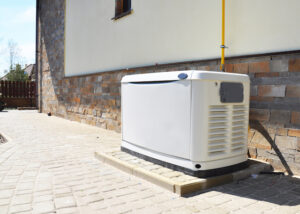
Picking the right fuel for your generator is an important decision that impacts its overall efficiency, reliability, and overall performance.
Picking the right fuel for your generator is an important decision that impacts its overall efficiency, reliability, and overall performance. Since their inception, generators have played a significant role in powering different applications, evolving from early models that used rudimentary fuels to today’s modern options. The history of generator fuel highlights its central role in harnessing power for different industries. In today’s blog, we will delve into important considerations that aid in determining the ideal fuel type for your generator, ensuring various operations and a prolonged lifespan. Read on to learn more!
What to Know About Generator Fuel
Generators have been necessary for powering different applications since their invention. Picking the right fuel is important for their efficiency and longevity. Common fuel types include gas, diesel, natural gas, biodiesel, and propane. Factors such as cost, availability, emissions, storage, and power output influence your decision. Gasoline is convenient but less efficient for long-term usage. Diesel offers better efficiency and a longer shelf life. Natural gas is cleaner but will require a constant supply. Propane is portable and clean-burning. Biodiesel is renewable but a bit less common. Opting for the best kind of fuel will ensure optimal generator reliability and performance.
What Exactly is Generator Fuel?
Generator fuel is a combustible substance that is used to power generators, which are devices that help convert mechanical energy into electrical energy. These fuels could include gasoline, diesel, propane, and much more. When the fuel is burned within a generator’s engine, it produces high-temperature gases that expand quickly, driving the engine’s piston and also turning the generator’s rotor. This motion generates electrical energy through electromagnetic induction. The choice of fuel will impact factors like efficiency, emissions, and maintenance. Different kinds of fuel have different energy densities and combustion characteristics, influencing a generator’s overall performance. Considerations like cost, availability, and environmental impact can guide the selection of the most suitable fuel kind for a particular generator application.
Factors to Consider for Generator Fuel
Shelf life for generator fuel is important. It refers to the duration that fuel can be stored before it degrades. Fuels with long shelf lives, like propane or diesel, are great for generators that aren’t used as frequently. Safety is important for generator fuel types, too. This involves assessing the fuel’s flammability, toxicity, and possible hazards during both usage and storage. Storage matters, too, and proper storage practices ensure that the fuel remains usable once needed, reducing the likelihood of any generator malfunctions.
Partner with Howard Energy, Inc. for Alternative Fuel Supply and Services
We’ve moved! Howard Energy is now located at 34 Thomas Ave, Brooklyn, MD 21225.
At Howard Energy, we fully understand how your business depends on a reliable and steady supply of gasoline and diesel fuel to keep your operations at its peak. As a family-owned, commercial full-service gas and diesel fuel supplier, Howard Energy has been serving companies across Maryland, Washington DC, and Northern VA for over 25 years.
Our team of experts has a thorough knowledge of the petroleum industry to devise commercial and retail fueling solutions. As a result, we use our keen insight to build strong partnerships with commercial trucking, construction, manufacturing companies, and more. Howard Energy is proud to bring our products and services to gas stations, car dealerships, marinas, and beyond – 7 days a week with no surcharge on holidays or weekends.
If you need cost-effective and convenient wholesale fuel and related fuel tank storage or monitoring services, contact us to get started. Call us at 410-647-1500, and visit our website. Stay connected with Howard Energy on Facebook, Twitter, and LinkedIn.
